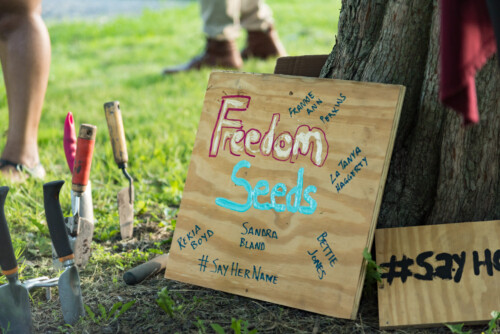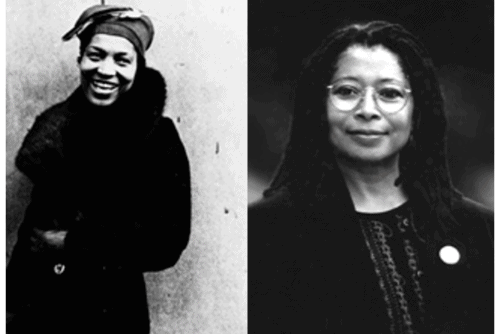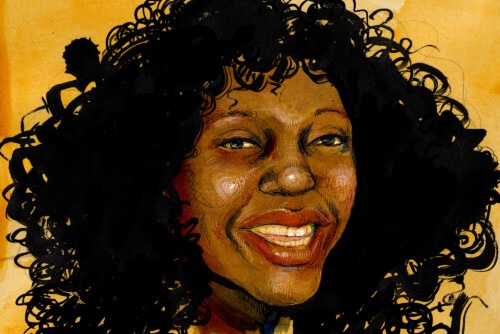The most difficult thing I have ever had to face as a mother and an aunt is being labeled and categorized as a “Sexual Offender.” Before I went to prison, I would have said that my motherly instincts gave my life a sense of purpose. I would never intentionally harm nor place any child at risk to be physical or emotionally damaged. But the harsh reality is that I am now being supervised and treated as someone that has and would.
Walking out of federal prison after seven years, a place that had become my home, was the most overwhelming and nerve-wracking moment of my life. Now I had to face the most degrading and embarrassing part of my sentence—registering as a sexual offender. It was hard to not to want to stay inside. Enduring the feeling of being labeled a monster while attempting to be a mother and aunt, as well as a productive member of society, has had me on an emotional rollercoaster since the day I stepped out of the prison gates. This label I have been given has so negatively impacted my life that some days it’s hard to even get out of my bed. Attempting to integrate back into my family and trying to get to know and parent a 15-year-old I last lived with many years ago has been a huge challenge. This reentry and sex offender registration process has traumatized me in so many ways. It has stripped me of the excitement about the new life I am building.
The first time I registered as a sex offender (something I have to do every six months), I remember feeling anxious and crying. What I remember most of that experience was the officer saying, “Failure to report any of these changes within 48 hours will result in a Third Degree Felony.” Walking out to my family awaiting me in the parking lot, my father asked what was wrong. The only response I could give through my tears was “Please take me back to prison. I can’t do this.” It has not gotten easier.
Three days after my release I had to call 911 on myself. During registration, the officers told me I had 48 hours to report any changes—to my residence, employment, vehicle, Internet identifiers, etc.—or else I could face a new felony charge. So, after three days of settling into my new surroundings, my daughter set up an email and Facebook account for me. I called the Sex Offender Registry Department to report these accounts, but no one answered. Five calls later with no answer, I was scared to death. Feeling as if I had no other option, I dialed 911. I explained that I was recently released from prison and on the registry, and their office was not answering to make note of my changes. The 911 operator advised me to calm down because I was hysterical. The words “third degree felony” kept playing in my head. She explained that the weekends did not count and that I was fine to report on Monday. Shaken, I hung up the phone with the operator and broke down.
The fact that I was not told that the weekends did not count during my initial registration only fueled my frustration, anxiety and embarrassment. Living in constant fear of making a mistake or forgetting to report a change made it impossible to sleep for the first 3 or 4 weeks home. Because of the fear, I still do not really do anything online.
Nonetheless, I have tried to get myself grounded after coming home. Fortunately, I was able to find work for the company that employs my father and brother.
After the second day at my new job, I came home to a police officer in my driveway. My heart fell to the floor—not because I did anything wrong, but because I assumed I forgot to do something. The officer advised me that this was a routine home verification. “Okay,” I thought, “I can do this. Be strong. It’s not that big of a deal.” Then the officer proceeded to tell me that during Halloween no one at my residence will be allowed to decorate or to pass out candy, nor would we be allowed to have Christmas nativity scenes in the yard. Hearing these rules immediately made me sob. I have never felt as embarrassed and ashamed in my life. While trying so hard to pick up the pieces to my life, I am being treated like a monster. In such a short time, this situation has repeatedly caused me to feel like an outsider, hopeless and alone, which makes me want to give up.
My sister, daughter, niece and nephew all play softball. They are always at the park for practices, games, and events. When my sister called and said she needed volunteers for the concession stand, I was more than happy to participate. Softball is one of my daughter’s passions and within her comfort zone; I knew that volunteering at games would be the perfect opportunity to get to know and bond with my daughter. I made sure that my probation officer knew and approved my volunteer position. However, she advised me that although I have no stipulations about being around children, she would fear for my safety if I participated. She knew that sex offenders are often targeted for attack. I realized I had to tell my sister that I should not go against my probation officer’s suggestions. After that, the disappointments seemed to continue.
I think a lot about how, before I went to prison, I did not see how offering advice to a young person, or anyone really, coming to the dope house and asking if I knew where she could make some money was a big deal. I had been there and done that. I knew all too well the feeling and need to survive. So many times, people who have been on the street for a while, particularly women, think we are helping younger women by taking them under our wing and showing them how to make money and stay safe while doing it. What I didn’t realize at the time was the extreme consequences and repercussions of helping someone under the age of 18 trade sex for money. In my case, while I was prostituting to survive, I let another person into an apartment to shower and clean up because she was high, homeless and had nothing. I introduced her to one date, who paid her $40.00. I held the money for her while she took the date and gave it to her after. Because she was a minor, for me, that $40.00 meant a long prison sentence and being labeled a “sex offender” for life.
I have been through so many things in my short 33 years of life. But now, being treated like a monster for doing something that to me was normal is very confusing. We all have the instinct to survive whatever situation we face; the only difference is that some decisions carry more consequences than others – some of them unfair and unwarranted. I have learned, and want to teach my daughter, that we have to live with our decisions—no matter how small or big.
Today, after being gone half of my daughter’s lifetime, I look at her with pride and admiration. She is my motivation on a daily basis and I want nothing more than for her to be as proud of me as I am of her. I hope that is possible despite how society has labeled me.
Afterword by Kate Mogulescu and K.B. White
The United States government released LeeAnn Adkins from federal prison on 7 December 2016, after she served nearly seventy-six months of an eighty-seven-month sentence for sex trafficking of a minor. LeeAnn was arrested and prosecuted when she was twenty-five years old.
In August 2016, the Legal Aid Society’s Exploitation Intervention Project 1 received a set of letters from eight women at the Tallahassee Federal Correctional Institution serving federal prison sentences, ranging from two to fourteen years, for sex trafficking offenses involving minors. LeeAnn contributed a letter to the set.
A few themes emerged from these letters, including how the writers viewed themselves as victims and as individuals charged with serious offenses, believed their own exploitation was ignored throughout their prosecution, and perceived the legal process to be arbitrary. They described how the criminal legal system’s reliance on harsh sentences, including designation as sex offenders, personally impacts their lives and relationships. Each also made clear that as the legal system continues to respond to issues of trafficking and exploitation in the sex industry, their voices, experiences, and perspectives should be heard and considered. With this piece, LeeAnn adds more of her voice to this conversation.
In October 2016, we traveled to Tallahassee Federal Correctional Institution to meet with LeeAnn and three other letter writers. We made another visit in March 2017. LeeAnn had been released, but several other women with similar experiences had reached out to us. This began a conversation about how the project and the larger anti-violence and criminal legal reform movements could support the informal women’s collective and vice-versa. From these discussions, we began the Human Trafficking Clemency Initiative 2 to pursue clemency for women convicted of sex trafficking minors who were unfairly labeled and disproportionately punished.
The criminal legal system responds to sex trafficking through catch-and-release policing of those engaged in the commercial sex industry. The system casts a wide net to ensnare those it deems criminal and relies on oversimplified binaries such as good/bad, victim/perpetrator, and choice/coercion. These false dichotomies often suppress the complex and nuanced experiences of individuals in the sex trade. As a result, system actors might label an individual engaged in the sex trade as a victim in one moment, a perpetrator a short time later, then a victim again, and so on.
The race of individuals involved also exacerbates the “victim/perpetrator” divide. Black women and other women of color are rarely afforded victim status and, if they are, it is often conditioned in compliance with a particular narrative. Any deviation is punished.
To make matters worse, nearly all individuals convicted of sex trafficking offenses are required to register as sex offenders, no matter the surrounding circumstances or that person’s role in the sex trade. The percentage of women among the individuals prosecuted for federal sex trafficking offenses is nearly double that of women prosecuted for general federal crimes. 3 Mirroring larger patterns in the criminal legal system, 82 per cent of the individuals that the initiative works with are women of color. Accordingly, the burden of sex offender registration is gendered and racialized in this context. LeeAnn’s experience highlights the profound impact sex offender registration can have on many of those women who are also mothers.
The weight of a criminal conviction is already a significant obstacle for those returning to their communities after incarceration, and registration only exacerbates the difficulty of reentry, as it makes housing and family reunification nearly impossible. Even though awareness of the collateral consequences of criminal legal system involvement and reentry resources have increased, individuals marked as sex offenders are purposefully excluded from efforts to help people returning home after imprisonment. This is consistent with a troublesome and persistent trend in criminal legal policy and reform in which violent offenses are carved out, misunderstood, and categorized punitively, with devastating consequences.
The work that lies ahead in this area picks up many of the threads and perspectives that emerged at the Invisible No More conference in January 2017. The experiences of the large number of women prosecuted as sex traffickers raise the specter of policing and punishing motherhood, womanhood, and sexuality. Arrests and prosecutions of women in the name of addressing exploitation in the commercial sex industry highlight the critical need to situate approaches to social problems outside of the criminal/prison system. In the meantime, LeeAnn and many women like her continue to navigate the unjust stigma, endless punishment, and suffocating surveillance that accompany conviction and sex offender registration.
- The Exploitation Intervention Project at the Legal Aid Society of New York began in 2011 with the support of the NoVo Foundation. The project develops better practices to identify, represent, and advocate for trafficked individuals prosecuted as defendants in the criminal justice system. It works to reshape the way prostitution-related arrests are handled in criminal courts, to raise awareness among criminal justice stakeholders on issues of trafficking and gender-based violence, and to advocate for survivors. In addition to its direct representation of thousands of individuals facing prosecution for prostitution charges, it has become a central point of advocacy in the criminal justice system for survivors of trafficking and is now an integral part of local and national campaigns to prevent the criminalization of trafficking survivors. K.B. White serves as the project’s paralegal/case handler. Kate Mogulescu, now an assistant professor of clinical law at Brooklyn Law School, founded the project and supervised it for six years.[↑]
- The Human Trafficking Clemency Initiative is a pro-bono representation project, made up of volunteer attorneys, legal advocates, and law school clinics, formed to assist women convicted in the federal criminal system of sex trafficking offenses. It identifies cases where legal assistance will shed light on these complicated, and often overlooked, issues and bring justice to the most marginalized and victimized women in the criminal legal system. It is a collaboration of Brooklyn Law School, the University of Baltimore Law School, the University of Maryland Francis King Carey School of Law, the Exploitation Intervention Project, and University of St. Thomas School of Law.[↑]
- From 2009 to 2014, of the 612 defendants charged with trafficking offenses (under 18 U.S.C. § 1581, 1583, 1584, 1589, 1590, 1591, 1592, and 1594), close to 25 per cent (149) were female. Department of Justice, Office of Justice Programs, Response to FOIA Request, 14 April 2017 (on file with authors). Compare with 13.8 per cent of all defendants charged with federal offenses (2016). United States Sentencing Commission, Overview of Federal Criminal Cases Fiscal Year 2015 (2016), https://www.ussc.gov/sites/default/files/pdf/research-and-publications/research-publications/2016/FY15_Overview_Federal_Criminal_Cases.pdf. See also Department of Justice, Office of Justice Programs, Bureau of Justice Statistics, Federal Prosecution of Human-Trafficking Cases, 2015, https://www.bjs.gov/content/pub/pdf/fphtc15.pdf.[↑]



